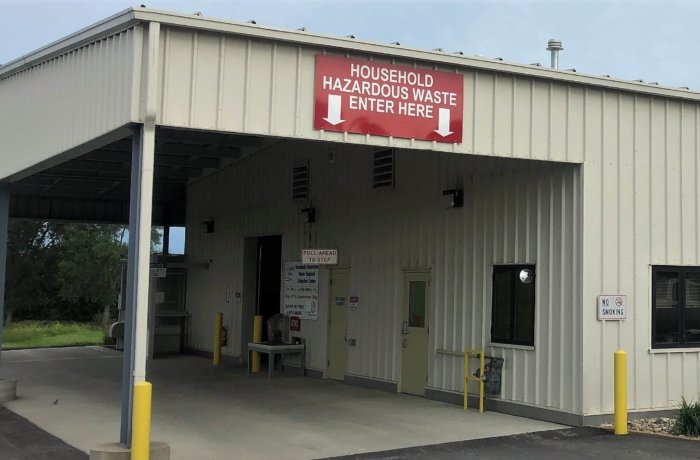Landfill of North Iowa Regional Collection Center (RCC) for Household Hazardous Materials (HHM)
What is the Regional Collection Center (RCC)?
Regional Collection Centers (RCC) are permanent collection facilities designated to assist the public and very small quantity generator (VSQG) business with the proper management and disposal of household hazardous materials.
The Landfill of North Iowa was one of the first in Iowa to open its RCC in 1996. Since 1995 when the Household Hazardous Materials (HHM) Program was created the number of RCCs has steadily increased.
The DNR’s goal is to have coverage available to every county in the state of Iowa. Currently, there are 27 permanent Regional Collection Centers (RCC) that serve 93 counties, including satellite facilities. Household hazardous materials (HHM) have decreased by 40 percent and now comprise only .2 percent of the waste stream as a direct result of more collection facilities.
The DNR is exploring ways to refine its pollution prevention programs, the Iowa Waste Exchange, and the Solid Waste alternatives Program (SWAP), in order to increase their efficiency and to provide the best possible outreach to business and industry.
Hazardous Materials
A hazardous product is one whose use or disposal poses a threat to human health or the environment. It should never be put in the trash, down the drain, into storm drains or burned. However, hazardous materials (HMs) are accepted free from LNI residents only.
What is a hazardous material?
How do you know if you have an HM? Read the label. Look for the words “poison,” “danger,” “warning” or “caution.” Any product which is reactive, corrosive, poisonous, or flammable is categorized as an HM. That would include products such as paints, cleaners, oils, insecticides, and solvents.
These Materials can be dropped off at the Landfill with NO cost to residential customers. Drop-offs are by appointment only. Call first to set up an appointment time and date. We set appointments every Tuesday, Wednesday, and Thursday from 8:00 am to 4:00 pm and the 2nd Saturday of each month from 8:00 am until 11:00 am.
The following is a list of materials accepted:
| Oil-based or Latex Paint | Aerosol Cans |
| Pool Chemicals | Kerosene |
| Insecticides | Photographic Supplies |
| Weed Killers | Varnish |
| Paint Thinner | Rug Cleaner |
| Fertilizers | Motor Oil |
| Furniture Stripper | Furniture Polish |
| Slug Bait | Antifreeze |
| Wood Preservative | Spot Remover |
| Rat Poison | Gasoline |
| Air Freshener | Glue, Cement |
| Household Batteries | Oven Cleaner |
| Vehicle Batteries | Toilet Bowl Cleaner |
| Drain Opener | Fluorescent Bulbs and Ballasts |
| Propane tanks |
The following materials ARE NOT accepted:
- Radioactive Materials
- Ammunition
- Explosives
- Medication
Radioactive materials, such as smoke detectors need to be sent back to the original manufacturer.
Ammunitions, contact your local police or sheriffs department for disposal.
Explosives, such as fireworks need to be soaked in water, placed in a plastic bag, and put in the trash.
Medications, leave in prescription bottles. Contact your local Police/Sheriff Departments for take-back programs.
Some pharmacies have a take-back program, please check with your local pharmacy.
What happens to my cleaners and paints after I drop them off?
When you arrive, you’ll be greeted by one of our trained environmental specialists who will assist you in the proper handling of your hazardous materials. From there, your products are evaluated for either further disposal or placement in our “Free Usable Products” area. Your waste material and/or containers are processed according to state and federal environmental regulations and sent to facilities permitted to handle hazardous material.
We believe in resource recovery as much as we believe in diverting waste from the landfill. Our “Free Usable Products” area offers free reusable products such as cleaners and paints. So if you’re bringing in an almost-empty bottle of glass cleaner, check and check to see if we have a replacement bottle.

